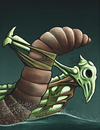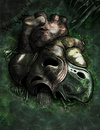The Chelonate
"Waves lap the slabby sides of a vast turtle-shell - bigger than any cathedral. Chelonites loaf on wooden docks around the shell-sides, staring sullenly. Lamps hang like decorations in a festive butcher's window. All around you, the sea is rank with scraps of ancient flesh."[1]
The Chelonate is an island-sized zee-turtle corpse inhabited by Monster-Hunters called Chelonites.
Live Bait
"A shell as big as a wild dream?"[2]
The Chelonate is a settlement built on a zee-turtle corpse called the Shell.[3] The smell of rot near the Shell can be so overpowering that it may overwhelm the mind; thanks to its influence, the Chelonites frequently duel and brawl where the stench happens to be the foulest.[4] Despite the fact that it's located near the Gant Pole, where zee-monsters go to die, the Chelonites are very quick to point out that their ancestors valiantly slew the zee-monster they're living on, and they will point this out with whatever weapons happen to be nearby.[5]
The Chelonites' culture is naturally based almost entirely on monster-hunting, and they regularly engage in incredibly violent hunts that can span all across the zee.[6] According to rumor, Chelonites that "die cowards" are not permitted to rest at zee; instead they're buried on any spat of land that will accept their bodies.[7] As monster-hunters, the Chelonites' diet is almost entirely meat-based, and includes viscera from the Gant Pole.[8] This principle includes their beer as well, which is apparently made of eel-blood, zee-fungus, and other ingredients that are perhaps best left unspecified.[5]
According to Chelonite tradition, one may not possess or use a name if they reside too close to the Gant Pole, for reasons unknown.[9]
The Chelonites' violent tendencies tend to bring them into conflict with other factions of the Unterzee, including the Khanate,[10] and they may extend these tendencies to unfortunate visitors of the Shell.[5] They also seem to have an enmity with the inhabitants of Polythreme, and the Chelonites use agents called Sniffers and Sounders to root out any potential spies.[11] The Chelonate has an interest in conquering Aestival, but the sunlight there naturally makes such a campaign incredibly infeasible.[12]
The Bone Men
"The Bone Man awaits you. His face and chest are streaked with white clay. His forehead bears a glyph, in the deep code of the void. Long ago, his mother ritually severed his littlest finger."[13]

The Bone Men are well-respected Chelonites responsible for maintaining an important temple dedicated to Storm. These warrior-priests are covered in white clay, have sigils in the Correspondence etched into their skin, and are missing their littlest fingers, which were severed by their mothers at a very young age.[13] The Bone Men are infamous for their violent temperaments, and seem to have a direct connection with Storm himself,[14] worshiping the god of the Roof with violent, bloody rituals.[15] They are also extremely skilled butchers, and they can reduce almost any meat to cutlets with mind-boggling precision.[16]
The Bone Men are responsible for hoarding the various treasures of the Chelonate within the Great Shell,[17][18] including the heirlooms of Monster-Hunters who declare themselves Doomed.[19] They do not give up their treasures lightly, not even for further wealth or other hunting trophies, and they often strive to reacquire any artifacts stolen from them.[18]
The Eater of Names

|
Beyond this point lie major spoilers for Fallen London, Sunless Sea, Sunless Skies, or Mask of the Rose. This may include endgame or major Fate-locked spoilers. Proceed at your own risk. You can find out more about our spoiler policy here. |
"Zailors tell tales of the great zhip made of bones. Bones of those who are lost to the zee..."[20]

A formidably armed priest-ship called the Eater of Names patrols the waters of the Carrion Sea near the Chelonate. Drawn by enormous worms and manned by seventy-seven Chelonite zealots,[20] it is apparently built from the bones of the creatures it has slain.[20] The Eater has plundered decades worth of zee-treasures, fighting endlessly in the name of the Shell and Death;[21] in fact, each time the Eater is destroyed, a new one will inevitably rise again.[22]
The Eater of Names' figurehead is made of gant, the color that remains when all others are eaten; its figureheads are apparently sourced from the nearby Gant Pole.[23]
The Glory's Tale
"I've long sought the tale of the Glory's end - Glory's what we call this beast. None still live from those days when we slew her. But the saying is: the tale still lives on history's beach. Bring me that tale, zee-captain. Please."[24]
"I broke my first shell. I roamed to the Unterzee. I feasted on monsters. I battened on whales. I grew city-vast. I sickened. The Gant Pole drew me, and there I died of age and weariness, turning on my back to rot until the hunters found me."[25]
The Chelonites are ever proud of their ancestors' achievement in killing the Glory, the zee-turtle that would become the Chelonate.[24] In fact, they're so proud of this feat that they occasionally host historical plays in Scrimshander depicting the great hunt.[26] The Chelonites have bargained with the Fathomking using the event as leverage,[27] though they are not exactly model vassals of the Fathomking and occasionally refuse to pay tribute.[28]

However, this tale of strength and bloodshed is a fabrication, concocted by historical revisionism magnified throughout generations. The Glory was born in Parabola, where it hatched from a massive, violet egg. It later roamed throughout the Unterzee, growing more and more massive with each passing year. As it feasted on zee-beasts and hunted down entire whales, it eventually grew sick and weary, and soon found itself near the Gant Pole. It turned over onto its shell to finally lay at rest,[25] and a starving hunter later arrived at the morbid scene, founding a settlement there.[27]
References
- ↑ The Chelonate, Sunless Sea
- ↑ The Chelonate, Sunless Sea
- ↑ Allow the Plausible Surgeon to go ashore here, Sunless Sea
- ↑ Compile a Port Report, Sunless Sea
- ↑ 5.0 5.1 5.2 Shore leave at the Chelonate, Sunless Sea
- ↑ Let them go hunting with Chelonites, Sunless Sea
- ↑ Tales of the Three Graves, Sunless Sea
- ↑ Cut some flesh for the Chelonate, Sunless Sea
- ↑ Side with the pretty one... (5 FATE), Fallen London "We live too close to the Gant Pole for names,"
- ↑ Side with the Chelonians, Sunless Sea
- ↑ A Bandage-Colony Reveal'd!, Sunless Sea
- ↑ Meet your contact, Sunless Sea
- ↑ 13.0 13.1 Deliver Sphinxstone for Penstock, Sunless Sea
- ↑ Slivvy, the Urchin who Talks to the Wind, Sunless Sea
- ↑ Send the tomb-colonists to visit Storm's Temple, Sunless Sea
- ↑ Find someone to teach secrets of butchery to the Bandaged Poissonnier, Sunless Sea
- ↑ Your Father's Bones: the Bone Men, Sunless Sea
- ↑ 18.0 18.1 Hand over the Stolen Bone, Sunless Sea
- ↑ Obtain a Doomed Monster-Hunter, Sunless Sea
- ↑ 20.0 20.1 20.2 Eater of Names, Sunless Sea
- ↑ Seize its cargo, Sunless Sea
- ↑ Show it a sketch of the Figurehead of the Eater of Names, Sunless Sea
- ↑ Seize its figurehead, Sunless Sea
- ↑ 24.0 24.1 Bring him a tale, Sunless Sea
- ↑ 25.0 25.1 You heard the Glory's story, Sunless Sea
- ↑ Watch a heroic play, Sunless Sea
- ↑ 27.0 27.1 Story description, Sunless Sea
- ↑ Listen to a Chelonate Envoy, Sunless Sea